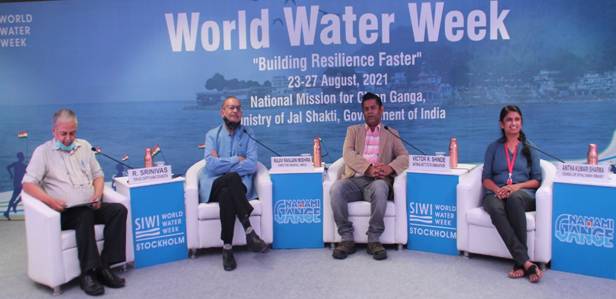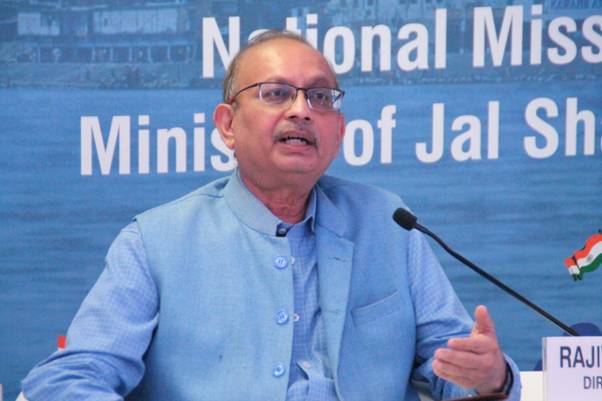Ministry of Jal Shakti
NMCG Hosts Session On ‘Developing River Sensitive Cities’On Day 3 Of Stockholm World Water Week, 2021
We Need To Focus On Developing Sustainable Ways & Methods While Planning Cities & Develop Management Plans Integrating Rivers with Cities: DG, NMCG
प्रविष्टि तिथि:
25 AUG 2021 8:04PM by PIB Delhi
National Mission for Clean Ganga hosted second Meet & Mingle session on ‘Developing River Sensitive Cities’ on the Third Day of Stockholm World Water Week 2021. Prof. Mona Aiyer from CEPT University moderated the session. She started the session by welcoming all speakers and participants and explained that the session is planned for practitioners and other stakeholders with the aim to mainstream river in city planning.
The Director General, NMCG, Mr. Rajiv Ranjan Mishra shared his thoughts on developing river sensitive cities in India and the importance of water sources and its linkage with human habitation. He informed that GRBMP which is developed by IIT consortium has also highlighted the need to focus on city or urban planning with integration of rivers and complete water cycle. He mentioned that river rejuvenation is directly related to urban development and rivers can be kept clean if our cities are kept clean and to achieve that we need river sensitive cities.

The DG, NMCG stated that we need to focus on developing sustainable ways and methods while planning a city and to develop management plans integrating rivers and cities. He emphasized on assessment and understanding of different water bodies in a city and to integrate water cycle of a city in its built environment. Mr. Mishra went on to say that NMCG is working with NIUA and other line departments to develop Urban River Management Framework and River Sensitive Master plan. According to him the key points that need to be inculcated is zone level planning and knowledge of what are the challenges experienced at the banks of the river. He talked about climate change leading to increased heat sensitive problems in urban areas and by river sensitive planning along with basin management, the problem can be resolved.

Mr. Mishra concluded by informing that the NMCG has conceptualized the “River City Alliance” with the aim to provide a unique platform to collaborate for achieving river rejuvenation through sustainable development and capacity building. He also informed about the NMCG’s initiative to support river sensitive cities planning by sponsoring 3 best research thesis by planning and architecture college students through national level competition and creating awareness among youth in this direction.
Prof. Mona Aiyer then invited Mr. Victor Shinde from NIUA to elaborate on the Urban River Management Plan (URMP) Framework. He informed that the framework is designed to support cities for river management and to operationalize the concept of IRBM at city level. The major challenge faced till now is with implementation of the concept and translating the philosophy into practice. He said that to overcome these challenges there is need to integrate IRBM in urban development and planning. The URMP framework is drafted keeping sustainability on priority which has comprised both environment, economic and social benefits. He also said that for each city there is choice of selecting 10 objectives given in the URMP framework. He concluded by informing that the URMP framework is city wise management plan which brings interconnectivity and can benefit at larger scale.
With this background, Prof. Mona Aiyer invited Mr. R. Srinivas from Town and Country Planning Organisation, MoHUA to talk about River Centric Urban Guidelines. He mentioned that we have 53 million plus cities and around 42 cities are located on the banks of rivers. The location of cities along the river signifies the provision of water, natural resources and biodiversity which are vital for cities. He mentioned that the guidelines are prepared to be circulated in states and UTs and it is important have delineated river zones. He informed about the components of guidelines such as it defines no development zone, restricted zones and so on. The guidelines are drafted to support river zones in cities and develop strong city images along with development of water resources. Lastly, he said we need to integrate blue and green infrastructure and need to recharge groundwater resources as well.
Continuing the discussion on guidelines, Prof. Mona Aiyer invited Dr. S. Rohilla from Centre for Science and Environment to talk on how to operationalize the guidelines. He said that the Ganga Basin is a complex issue and there are around 2000 urban centres with 600 big centres along the stretches of river Ganga. Talking about the small and medium towns he said that they are swiftly increasing in size and we will lose opportunity if we will not be able to develop and implement the river centric urban planning. He said that it can be converged with other on-going schemes and missions such as Jal Jeevan Mission (Urban), Smart Cities Mission, Swachh Bharat Mission (Urban) and so on to bring the decentralization of planning by focusing on individual building and neighbourhood levels. He closed his remarks by reiterating the fact that water sensitive designs need to be integrated with urban development designs.
Prof. Mona Aiyer invited various professionals from among the participants to share their views on the topic of discussion. Prof. Vinod Tare from IIT Kanpur talked about developing the additional wetlands, decentralized water management designs and optimal utilization of man-made and natural ways to bring rivers sensitivity in city planning. He primarily focused on utilising nature-based solutions and understanding the concept of one water system comprising all forms of water bodies in planning. Following him, Dr. Anitha Kumari Sharma from Royal Dutch Embassy talked about the need of long-term planning and involving all the stakeholders in planning the cities with focus on conserving river’s overall health.
Prof. S. Chary gave two important points to focus on which involve development of urban centric governance framework at chief secretary level as several departments beyond city level also do have jurisdiction and creating a platform for innovation and startups to support in making cities river sensitive. Ms. Panchali from SIWI mentioned case studies of Cape Town, Miami and other international regions which can be referred for developing river sensitive cities in India. She talked about cooperation and integration at regulatory levels.
Lastly, Mr. Suresh Babu said that to bring citizen engagement we need to mainstream urban governance at different levels and create a forum to often engage in discussions to find relevant solutions with the focus on making cities river sensitive. Concluding the session, Prof. Mona Aiyer summarized the discussions and deliberations and DG, NMCG, Mr. Rajiv Ranjan Mishra thanked everyone for their contribution and suggestions.
**********
BY/AS
(रिलीज़ आईडी: 1749030)
आगंतुक पटल : 1501